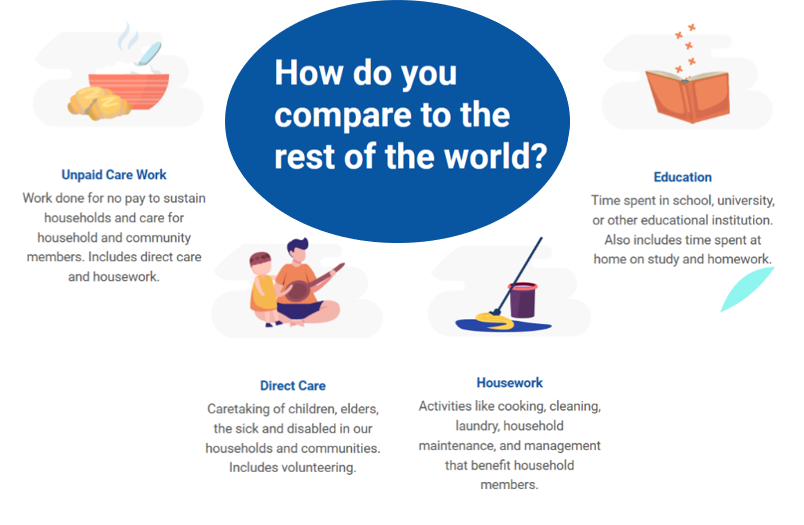School closures and unpaid care work under Covid19
Counting Women’s Work makes a “back of the envelope” calculation to estimate the impact of Covid19-related school closures on unpaid care work.
As the Covid19 pandemic spreads across the globe, many governments are closing schools entirely or replacing in-person education with distance learning that students do from home. In either case, hours a day that children used to spend at school in the care of paid teachers and other school personnel, they instead spend at home with parents and other family members.
With school closures and other large-scale disruptions, there is a clear need for data on how these closures impact unpaid care work and paid work in households. Those data will come when nationally representative time use surveys are fielded again to compare with those from before pandemic-related closures. In the meantime, CWW does have tools to help us estimate the scale of the impact. How much will adults’ unpaid care work increase due to time spent supervising children out of school?
Taking data from Education at a Glance: OECD Indicators, we estimate that students spent 22-26 hours per week in school during months when school is in session, depending on the level of schooling. For high school students, it is less likely that they will require adult supervision so we will estimate their time at only 13 hours per week. Multiplying these estimates by the total numbers of children of each age by the hours per week estimated for their level of schooling gives us an aggregate amount of time shifted from schools to households. If we assume that these hours are provided in the same proportion as childcare hours are provided now, we can use CWW’s estimate of childcare production by age and sex to distribute those hours to adults.
The results look like the figure below, for a set of 17 countries in the CWW project. Men are shown in the blue lines, women in the red.
Hours per day of additional childcare due to school closures, for men in blue, for women in red. Some time may be supervisory and not direct interactive care. (Source: CWW estimates and OECD data on average schooling hours)
The increases fall mostly on women because they provide most of the direct care in these countries. There is a wide range of potential increases for two reasons: 1. some countries have many children relative to the number of adult caregivers and some countries have fewer, and 2. some countries share caregiving responsibilities more evenly between men and women and more evenly over the age range. At peak ages for childcare in Bangladesh and Senegal, school closures could result in more than three additional hours per day in childcare. In Spain and Colombia, it could be less than an hour per day. Of course, this is averaging across parents and non-parents, as CWW estimates are averages across all persons of a particular age and sex. Further exploration within each country would be needed to find the impact per parent instead of per adult.
On International Women's Day, count your care with CWW's new web app!
On International Women’s Day 2020, make care work count by counting all work. CWW’s online data app allows users to compare the time they spend in housework, household management, and care for others with care producers around the world.
On International Women’s Day, we reflect on how far the world has come in giving women and girls equal opportunities and how far we still have to go. We have made great strides toward gender equality in primary education, property rights, protection under the law, and access to labor markets. Large gender gaps still exist in wages, political representation, wealth, and enforcement of laws on gender equality. One factor behind some of these gaps may be unequal responsibility for unpaid care work.
Counting Women’s Work data shows us how large those gaps are and how they differ by age, country, and region. Click the button below to try our new online app and see how much time YOU spend in unpaid care work compared to people around the world.
While you are counting your work, let’s think about what it means. Is this work valuable? Is it valued? Are we satisfied with how the drudgery and joy is shared by women and men, governments and private markets? The more we count ALL of our work, the more our work counts.
KIHASA-EWC Conference, December 3, 2019, Seoul, Korea
Members of the Counting Women’s Work and National Transfer Accounts projects will be presenting research at a joint conference in Seoul, hosted by the Korea Institute of Health and Social Welfare (KIHASA) of Korea and the East-West Center (EWC) of the United States.
Members of the Counting Women’s Work and National Transfer Accounts projects presented research at a joint conference in Seoul, hosted by the Korea Institute of Health and Social Welfare (KIHASA) of Korea and the East-West Center (EWC) of the United States.
The theme of the one-day conference is “Challenges and Policy Responses to Population Aging.” Gretchen Donehower, the principal investigator of CWW will speak on unpaid care work, while members of NTA teams from the United States, Korea, Japan, and Spain will discuss what NTA estimates tell us about how aging will impact productivity, consumption, public and private transfer systems, and economic growth, and what policies are available to maximize desirable outcomes.
Web links:
KIHASA: https://www.kihasa.re.kr/english/main.do
EWC: https://www.eastwestcenter.org
African Population Conference November 18-22, Entebbe, Uganda
Researchers affiliated with Counting Women's Work and the National Transfer Accounts projects will be presenting research at the 8th annual conference of the Union of African Population Scientists in Entebbe, Uganda.
Researchers affiliated with Counting Women's Work and the National Transfer Accounts projects will be presenting research at the 8th annual conference of the Union of African Population Scientists in Entebbe, Uganda. Some of the presentations are listed below, from the preliminary program. Please see the conference website for final details: http://8apc2019.org/home/
event banner from http://8apc2019.org/home/
Session: Monday, November 18 / Lundi, 18 Novembre 4:00 PM - 5:30 PM, Theatre Hall - Ground Floor, First DD and Prospects for the Second DD in Africa • Vieillissement et deuxième dividende démographique
Paper: Déficit du cycle de vie et capture du dividende démographique en Afrique Subsaharienne : Nécessité d’une autonomisation des femmes sénégalaises • Lesfran Sam Wanilo Agbahoungba, LAREG (Université de Parakou) & CREG (Sénégal); Latif Dramani*, CREG-CREFAT; Edem Akpo, CREG-CREFAT
Session: Tuesday, November 19 / Mardi, 19 Novembre 9:00 AM - 10:30 AM, Kyoga Hall - Ground Floor, Role of Gender in Accelerating the Demographic Dividend • Rôle du genre dans l'accélération du dividende démographique
Paper: Capital humain et Capture du dividende démographique au Sénégal : Une approche genre • Edmée Marthe Y. Ndoye*, Université Cheikh Anta Diop de Dakar; Latif Dramani, CREG-CREFAT
Session: Tuesday, November 19 / Mardi, 19 Novembre 11:00 AM - 12:30 PM, Kuku Hall - First Floor, African Models for The Demographic Dividend – Practical Interventions, Lessons and Policy Options • Modèles africains pour le dividende démographique - Interventions pratiques, leçons et options politiques
Paper: Understanding the Demographic Dividend in Ghana, Sierra Leone and the Gambia: A Prospect or Missed Opportunity? • Stephen O. Kwankye*, University of Ghana; Eric Arthur, Kwame Nkrumah University of Science and Technology (KNUST); Faustina Frempong-Ainguah, Regional Institute for Population Studies/University of Ghana; Eugenia Amporfu, Kwame Nkrumah University of Science and Technology, Kumasi
Session: Wednesday, November 20 / Mercredi, 20 Novembre 2:00 PM - 4:00 PM, Executive Room - Ground FloorGender Dividend • Le dividende du genre
Paper: Demographic Dynamics, Gender Dividends and the Achievement of Sustainable Development Goals: Evidence from Nigeria • Olanrewaju Olaniyan*, University of Ibadan; Noah Olasehinde, University of Ibadan; Osaretin Adonri, United Nations Population Fund (UNFPA); Andat Dasogot, United Nations Population Fund (UNFPA)
Session: Thursday, November 21 / Jeudi, 21 Novembre 2:00 PM - 3:30 PM, Executive Room - Ground Floor, Education, Employment and Transformation of Gender Relations • Education, Emploi et Transformation Des Rapports De Genre Au Sein Des Ménages
Paper: Travaux domestiques et inégalités genre dans l’éducation dans les pays en développement d’Afrique Subsaharienne: cas du Sénégal • Lesfran Sam Wanilo Agbahoungba*, LAREG (Université de Parakou) & CREG (Sénégal); Latif Dramani, CREG-CREFAT; Edem Akpo, CREG-CREFAT
Session: Friday, November 22 / Vendredi, 22 Novembre 11:00 AM - 12:30 PM, Elgon Hall - Ground Floor, The Use of Demographic Intelligence to Influence Development Policies • L'utilisation de l'intelligence démographique pour influencer les politiques de développement
Paper: National Transfer and Demographic Dividend: Application in West and Central Africa • Latif Dramani*, CREG-CREFAT; Edouard Talnan, United Nations Population Fund (UNFPA)
Paper: Demographic Dividend Monitoring in West and Central Africa • Edem Akpo*, CREG-CREFAT
The Quantity‐Quality Tradeoff: A Cross‐Country Comparison of Market and Nonmarket Investments per Child in Relation to Fertility
CWW researchers published “The Quantity‐Quality Tradeoff: A Cross‐Country Comparison of Market and Nonmarket Investments per Child in Relation to Fertility” in Population and Development Review.
Vargha, L. and Donehower, G. (2019), The Quantity‐Quality Tradeoff: A Cross‐Country Comparison of Market and Nonmarket Investments per Child in Relation to Fertility. Population and Development Review, 45: 321-350. doi:10.1111/padr.12245
ABSTRACT:
The aim of this article is to show how various investments in children are related to fertility in a cross-national comparative context. We consider “child quality” as produced not only by market goods and services, but by inputs of unpaid care time as well. We integrate market investments in children with the imputed value of unpaid time devoted to childcare and other household services. Our measures are based on National Transfer Accounts (NTA) that disaggregate national accounts by age, extended by National Time Transfer Accounts (NTTA), which estimate the same quantities for nonmarket household production activities using time-use surveys and imputed wages. We find that: (1) unpaid care time represents a large portion of total investments in children; (2) there is a significant negative association between fertility and investments per child; and (3) incorporating unpaid care time into the analysis makes theorized relationships between quantity and quality of children more robust.
Time Use and Transfers in the Americas - Producing, Consuming, and Sharing Time Across Generations and Genders
CWW researchers published Time Use and Transfers in the Americas: Producing, Consuming, and Sharing Time Across Generations and Genders, featuring chapters on National Time Transfer Accounts methodology, results from Costa Rica, Uruguay, Colombia, and the United States, as well as cross-country comparative work.
Urdinola, B.P. and Tovar, J.A., 2019. Time Use and Transfers in the Americas. Springer International Publishing.
About this book:
This book provides a comparison of the measurement in time and monetary units of unpaid domestic work in Colombia, Costa Rica, Uruguay, and the Hispanic ethnicity in the United States. A standardized technique allows the development of comparable estimates across countries per age and gender which reveal specific behavioral patterns over the life cycle. A mixture of economic conditions, social norms, and demographic trends provide insightful explanations for the unequal burden that women and girls carry when dealing with unpaid domestic activities, an economically significant but traditionally neglected activity. As such, the book is of interested to practitioners in all social sciences, particularly sociologists, demographers, economists, and policymakers.
Categories
Tags
- Africa 3
- Asia 3
- Audio 2
- Brazil 1
- Burkina Faso 2
- Colombia 10
- Costa Rica 10
- Covid19 2
- Cross-country 19
- El Salvador 1
- Europe 5
- Example Code 1
- Fertility 2
- Gender Dividends 3
- Ghana 4
- Hispanic ethnicity 1
- Human Capital 1
- Hungary 1
- India 3
- Kenya 2
- Latin America 7
- Mauritius 2
- Methodology 6
- Mexico 4
- Policy-related 10
- Senegal 5
- Slides 10
- Slovenia 1
- South Africa 9
- South Korea 2
- Spain 2
- Spanish language 4
- Turkey 1
- United States 3
- Uruguay 2
- Video 7
- Vietnam 4
- Web Conference 4













